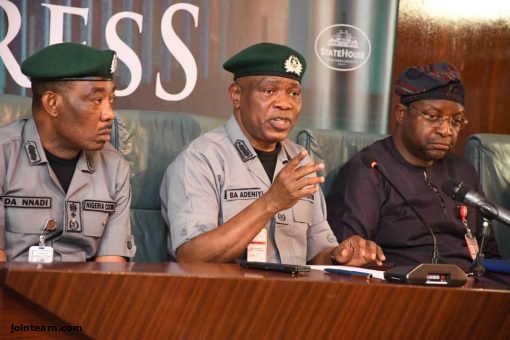
The Federal Government says the upcoming high-level African customs conference scheduled for Abuja next week will play a pivotal role in driving economic recovery, strengthening competitiveness, and expanding export opportunities for small and medium-sized businesses under the African Continental Free Trade Area (AfCFTA).
Comptroller-General of Customs, Adewale Adeniyi, told journalists at the State House on Friday that President Bola Ahmed Tinubu’s strong backing for the event underscores the administration’s commitment to placing trade at the centre of national development, industrialisation, and poverty reduction.
The conference will bring together more than 30 African customs administrations, including 22 Director-General-level representatives, as well as senior government officials, manufacturers, investors, shippers, airlines, logistics operators, and port authorities. Discussions will focus on eliminating long-standing barriers to intra-African trade and strengthening continental economic integration.
Adeniyi described the event as a strategic shift from tradition, noting that the opening day will be led by the private sector to allow businesses speak directly to customs authorities and policymakers about the realities of cross-border trade.
“Governments don’t trade; customs doesn’t trade. It is economic operators who move goods. Their voices must shape the reforms — whether on non-tariff barriers, procedural delays, port inefficiencies or uneven application of AfCFTA preferences,” he said.
Although Nigeria has recorded more than 30 per cent growth in export volumes in the last two years, Adeniyi noted that most of the increase has been directed outside Africa. Redirecting exports into the continent’s $3.4 trillion market, he said, would unlock new value chains, lower logistics costs, ease currency settlement challenges and create jobs.
He highlighted progress recorded under the Authorized Economic Operator (AEO) programme, with SMEs already exporting leather goods, handicrafts, processed foods and hibiscus flowers to Southern Africa, demonstrating Nigeria’s potential to compete effectively on the continent.
Adeniyi linked the country’s readiness for AfCFTA to wider government reforms including customs modernisation, port decongestion, infrastructure upgrades and the rollout of a national single window. He added that Nigeria’s selection to host the next Intra-African Trade Fair and President Tinubu’s designation as Champion of Intra-African Trade in Services reflect the nation’s growing leadership role.
Addressing concerns about possible revenue losses from tariff liberalisation, Adeniyi said long-term economic gains far outweigh short-term pressures. “Yes, we collect revenue, but trade brings far greater prosperity. You cannot eat your cake and have it,” he said.
He identified key priorities for the conference: a unified customs position on AfCFTA implementation, solutions to non-tariff barriers, a single platform linking customs, financiers and economic operators, stronger partnerships with Afreximbank and the AfCFTA Secretariat, and practical reforms to boost competitiveness.
Adeniyi revealed that AfCFTA implementation is now a key performance indicator tied to his extended mandate, noting that the agreement requires strong political will and capacity building as member states gradually phase out customs duties on intra-African trade.
He also cited the newly introduced Concept of Partnerships for African Cooperation (CIPAC), which has rallied major national players — including NEPC, NEXIM Bank, commercial banks and NPA — to support Customs’ leadership in AfCFTA implementation.
Acknowledging challenges experienced by regional trade blocs in the past, Adeniyi said the obstacles are common across the continent. He stressed that duty-free access for African-made goods would reduce production costs, expand markets and stimulate investment.
The Customs chief reported strong institutional performance, with revenue growing by more than 70 per cent in 2023 and 101 per cent in 2024, and projections indicating a new record in 2025. He maintained that Customs remains committed to revenue collection, national security and trade facilitation.
Adeniyi described the forthcoming Abuja conference as a national effort to reposition Nigeria within Africa’s trade architecture.
“This conference is about Nigeria signalling its readiness for Africa. With your support, Nigerians will better appreciate the enormous opportunities that AfCFTA holds for our economic renewal,” he said.
He urged the media and citizens to support the initiative, adding: “We need your cooperation and guidance to help Nigeria and Africa fully realise the potential that trade offers.”


Leave a Reply